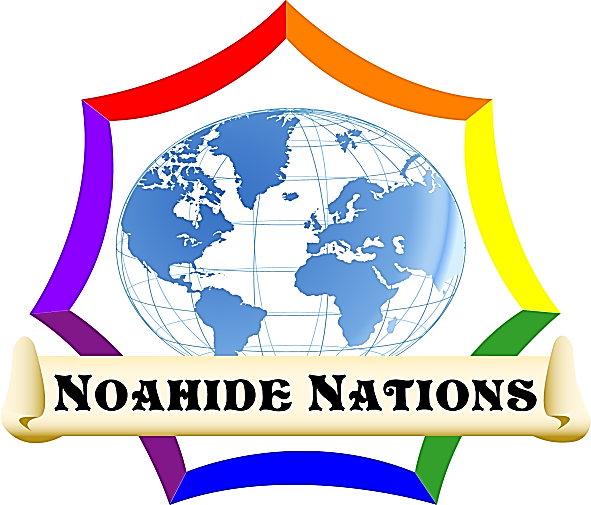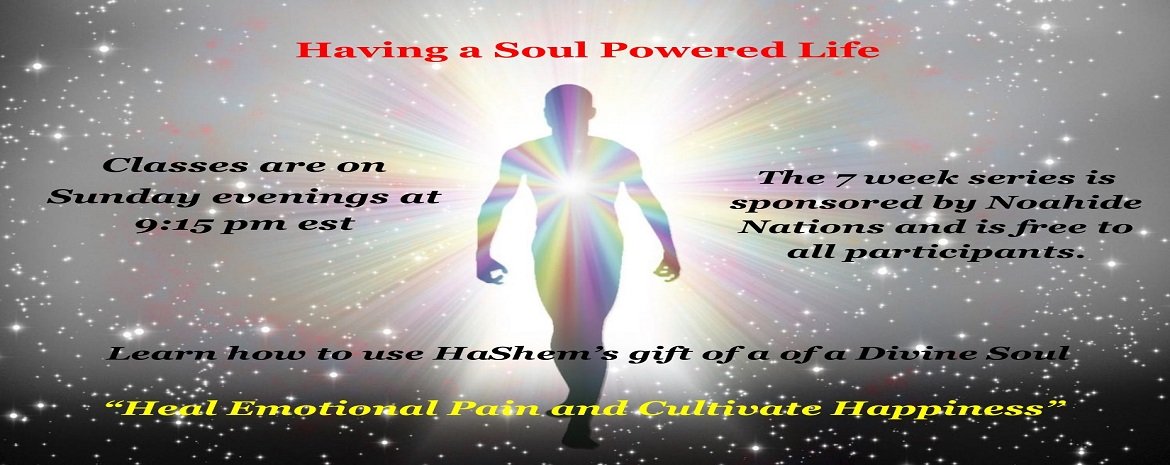ARE NOAHIDES ALLOWED TO PRAY?
- Category: TREASURE CHEST OF TORAH WISDOM
- Hits: 34198

More on Noahide Dinim From the Noahide Laws Yeshiva Course
Neither the Talmud nor Maimonides mentions prayer of any type as being an obligation for Noahides.
At least one earlier authority, however, did recognize such an obligation. Rav Shmuel ben Chofni Gaon, in his commentary on the Torah[1], lists prayer as one of the expanded obligations of the Noahide laws.
A contemporary of Rav Shmuel ben Chofni Gaon, Rabbeinu Nissim Gaon, does not list prayer as an obligation, but he implies such, writing:[2]
Not all of the Seven Laws and their derivations require revelation. For example – the obligation to recognize God, to obey Him, and the obligation to serve him – all of which are rational and can be logically derived.
The Hebrew term used by Rabbeinu Nissim for serving God, le-avdo, is usually understood as a specific reference to prayer. It is possible, though, that Rabbeinu Nissim is using the term le-avdo in its more general sense, meaning simply to serve. Nevertheless, the general idea conveyed by the passage is a concept true to both Jewish and Noahide thought: that we are obligated to observe many principles by force of logic and reason alone, without any specific revelation.
For example, Jews are required to make blessings before and after eating and drinking. The Talmud[3] explains that the source of this obligation is logic rather than revelation.
Similarly, the obligation for Noahides to pray is not sourced in any particular textual derivation, but is rooted in reason.
Curiously, though, it is not mentioned in the writings of Maimonides or in the Rema Mi-Fanu’s statement of the Noahide laws.[4] This omission is odd considering that non-Jewish prayer is referred to many times in Tanakh, Scripture. For example:
My house shall be called a house of prayer for all peoples.[5]
On this verse Rashi remarks that the temple is a house of prayer not only for Jews but for all peoples. Also:
Praise the L-rd, all nations, extol Him all the peoples.[6] We see from these versus that prayer is expected for non-Jews as well.
Rav Moshe Feinstein ztz’l,[7] in a responsum on Noahide practice,[8] puts prayer into perspective. According to Rabbi Feinstein, Noahides have no regular obligation to pray (this is in contrast to Jews who are required to pray daily facing east). Rather, all Noahide prayer is of the unfixed and personal type mentioned above.
For Noahides, prayer is only a mitzvah when performed in response to personal needs or circumstances. If one experiences challenges for which he does not pray, his lack of response is tantamount to a denial of God as the sovereign ruler of all things and all events. When one does pray in such circumstances, it demonstrates reliance and belief in the Creator.
When a Noahide prays to give thanks or praise absent a personal need, he still receives reward for such prayer even though it is not of the same nature as prayer prompted by personal needs.
It appears that many early authorities do not list prayer as an obligation due to its free, unfixed nature and due to its being derived from reason rather than revelation or textual exegesis.[9]
In summary:
- Jews have regular obligations to pray regardless of their personal needs or
- Noahides have no regular obligation to pray. Rather, prayer as a response to personal needs or circumstances is obligated by force of reason. For this prayer they receive reward for having performed a mitzvah,
- Nevertheless, prayer in praise of God for His might and for having created all things is still a mitzvah and rewarded even though it is entirely
Texts of the Prayers
As with all personal prayers, there are no fixed texts for Noahide prayer. Since all Noahide prayer is essentially personal prayer, it is ideally expressed using sincere words from the heart.
However, we all sometimes need help jump-starting our prayers. In such cases, using a text can be of tremendous help.
The Siddur – Using the Jewish Prayer book
Many Noahides have asked about using the standard Jewish prayer book, the Siddur, for their personal prayers.
The core liturgy of the siddur was established in the 4th century BCE by the Anshei Kenesses HaGedola, the Men of the Great Assembly. This was a group of scholars and prophets under the leadership of Ezra who rebuilt and reestablished Jewish practice in the Holy Land following the destruction of the first temple. After the destruction of the second temple, the prayer book underwent a number of subsequent revisions to reflect the situation of diaspora Judaism.
The result is a prayer book specifically tailored to the unique obligations and needs of the Jewish community in exile. As such, most of the siddur is not relevant to Noahides.
For example, the siddur is replete with prayers for “the return to Israel,” and prayers invoking the merit of Abraham, Isaac, and Jacob. A Noahide cannot recite these passages since Noahides do not have a share in the land of Israel or in the heritage of Abraham, Isaac, and Jacob. Additionally, many passages refer to mitzvos that only apply only to those with a Jewish lineage.
For these reasons, it is preferable advisable that Noahides do not use the Jewish prayer book. Nevertheless, there are a few sections of universal application. We will look at these in our next lesson on prayer.
The Psalms – The Universal Prayer book
Instead, many rabbis have advised Noahides to use the book of Psalms, Tehillim, as their prayer book. The book of Psalms is a collection of the personal prayers of King David and many other great people.[10] This “universal prayer book” gives voice to even the most subtly nuanced needs of the soul. At the end of this lesson we have attached an index of Psalms suitable for many occasions.
Modern Collections of Noahide Prayers
Despite the Siddur’s general inapplicability to Noahides, it contains some material universal to both Jews and Noahides. In the past decade many attempts have been made to adapt this material into a regular order of Noahide prayers. In the next lesson on prayer we will examine these collections and suggested orders of Noahide prayers as well as excerpts from the siddur.
Practical Advice: How to Pray
Prayer is more than just speaking to God – it is the establishing of a relationship. Like all relationships, it takes work and communication. Our sages and tzaddikim (righteous ones) have established certain benchmarks for prayer to help us maximize our potential.
1) Identify your prayer A prayer will always fall into one of the three categories below. Identifying your prayer will help you to better understand the prayer’s purpose and helps guide how to speak to God and articulate what is in their heart. The sages have identified three modes of prayer:
- Requests – Asking God for one’s needs or for the needs of others. This includes both spiritual and physical
- Praise – Praising God for the abilities that are unique to Him For example: praising God for his creation of the sun and the heavens, or for His ability to give life and heal sickness.
- Thanks – Expressing gratitude to God for all that He has done on behalf of the petitioner. For example, health, family, friends and
2) Prayer should be verbalized: By verbalizing our prayers we are forced to give voice and articulation to our most important concerns. Articulating them via speech gives honor to both the prayer and to God the recipient.[11]
3) Set aside regular times for reflection and prayer: Though Noahides are not obligated in set times for prayer, establishing regular times for prayer spiritual reflection is intrinsic to the spiritual life of Jew and Noahide alike. This personal time should be fixed, regular, and sacred. The place should be somewhere private, quiet, and respectful. Some people will set aside time daily, others weekly. The beauty of Noahism is that you know what you have to do, but have a good amount of freedom to personalize it.
4) Make a point of praying for all of your needs throughout the day: God provides EVERYTHING. Even things appearing to come solely by the hand of man are still provided by God. Therefore, it is appropriate to pray for all of one’s needs, whether great or small, physical or spiritual, silly or serious. Anything a person has is only a result of God.
5 ) Prayer is directly and only to the one true God and creator of all: Noahism and Judaism both reject the idea of praying to or through any intermediary. Additionally, we only pray envisioning God as a single unity, not an entity with multiple forms or expressions. These concepts of a disparate God or of an intermediary are idolatrous and prohibited for Jews and Noahides alike. All you need to connect with God is you, your prayers, and God.
[1] Commentary to Genesis 34:12. Chofni’s Torah commentary was entirely forgotten until its rediscovery in the Cairo Geniza. It even appears to have been unknown to Rav Shmuel’s contemporaries. Originally in Arabic, it was not translated and published until 1978.
[2] Introduction to Tractate Brachos.
[3] Brachos 35a.
[4] The Rama Mi-Fanu’s list was brought and discussed in an earlier lesson. It seems that R’ Shmuel ben Chofni’s expansion of the Noahide laws was unknown to Maimonides and Rama Mi-Fanu.
[5] Isaiah 56:7.
[6] Psalms 117:1.
[7] Rabbi Moshe Feinstein (b. Russia, 1895 – d. New York, 1986) was the foremost Torah authority of his generation and one of the most important scholars of the past 200 years. His magnum opus, the responsa Igros
[8] Igros Moshe II:25.
[9] See Nachmanides’s commentary on Maimonides’s Sefer HaMitzvos regarding whether or not prayer should even be included among the 613 mitzvos for Jews.
[10] See Bava Basra 14b. It is a popular misconception that King David was the author of the Psalms. Though true that he authored many of them, he also edited the final collection, choosing to include many writings from earlier authors.
[11] See Igros Moshe OC II: 25 that Noahides should verbalized their prayers. Purely mental prayer, even by Jews, is used only in extenuating circumstances.


 French (FR)
French (FR)  English (UK)
English (UK) 




